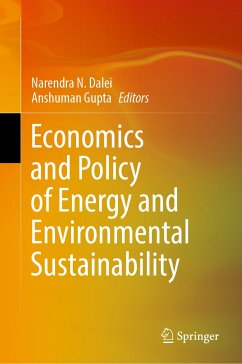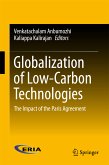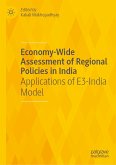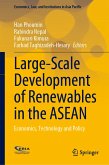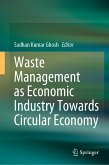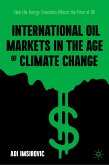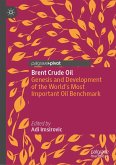This book explores the linkages among economic development, energy, and environment. An increase in economic activity is correlated with a higher level of energy consumption, which in turn leads to an increase in environmental pollution. Due to the influence of greenhouse gases, the higher the concentration of pollutants in the atmosphere, the higher the temperature, which ultimately leads to climate change. Under these imminent dangers, the role of economic and energy efficiency policies becomes important for ecological sustainability. The present policies, however, in various instances, have failed to address these issues. Hence, this book embarks not only to suggest modifications to improve the efficacy of the current policies but also to recommend to the policymakers, new and more effective policies for their respective countries. The book is bifurcated into two sections: The Economics and Policy of Sustainable Energy section discusses renewable energy policy responses to observed Impact of climate change using DPSIR Framework; the energy utilization strategies for transportation and commercial activities of Charland Bangladesh; the relationship of market globalization with the Indian energy sector; the socioecological effects of globalization from an energy perspective brought to a local standpoint; the seasonal disaster-induced energy consumption strategies of the char-dwellers of Bangladesh with respect to their domestic chores and agricultural activities; trends in GDP growth and energy usage in India; cross-border trade of electricity; and the events that the oil and gas industry has already faced and possible strategies it can adopt to overcome the recession caused by the COVID-19 pandemic. The Economics and Policy of Environmental Sustainability section analyses topics such as the role of hyper-globalization in spreading the pandemic across countries as threat to human ecology; the current scenario of environmental consequences, and future prospects of plastic pollution; the surface air temperature anomalies over selected countries of Africa; the impaired roles of the female gender in community natural resource exploitation in Ndop; the operational expansion strategies for garnering better output in terms of livelihood and conservation; opportunity for environmental justice and rethinking global community; linking indigenous traditional knowledge and sustainable development goals in the North-Western Himalayas; and recommendations to manage dry forest carbon stock.
This book is a rich resource for policymakers, guiding them through untraveled pathways. Moreover, it is an extremely helpful resource for researchers, practitioners, industry professionals as well as students in the fields of energy, environment, and sustainable development with flavour of economics and policy.
This book is a rich resource for policymakers, guiding them through untraveled pathways. Moreover, it is an extremely helpful resource for researchers, practitioners, industry professionals as well as students in the fields of energy, environment, and sustainable development with flavour of economics and policy.
Dieser Download kann aus rechtlichen Gründen nur mit Rechnungsadresse in A, B, BG, CY, CZ, D, DK, EW, E, FIN, F, GR, HR, H, IRL, I, LT, L, LR, M, NL, PL, P, R, S, SLO, SK ausgeliefert werden.

